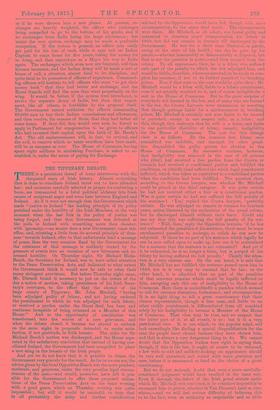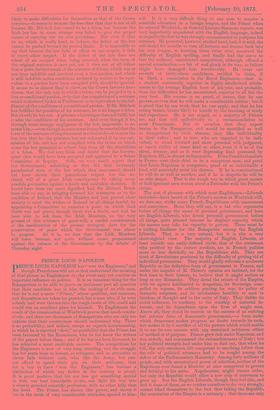THE TIPPERARY DEBATE.
THERE is a persistent thread of irony interwoven with the chequered story of Irish history. Almost everything that is done to conciliate Ireland turns out to have alienated her ; and occasions carefully selected as proper for conferring a boon, are transmuted by a fatal political alchemy into fresh causes of reciprocal anger and even hate between England and Ireland. As if it were not enough that the Government which made " justice to Ireland " the leading principle of its policy perished under the hostility of the Irish Members, at the very moment when the last link in the policy of justice was being forged, and that that Government was defeated at the polls in Ireland with something more than disaster, with ignominy,—no sooner does a new Government come into office, and, relenting a little from its avowed principle of 'firm- ness ' towards Ireland, offer to that unfortunate land a message of peace, than the very occasion fixed by the Government for the utterance of that message is suddenly turned by the pressure of events into an occasion of new bitterness and in- creased hostility. On Thursday night, Sir Michael Hicks- Beach, the Secretary for Ireland, was to have called attention to the Peace Preservation Acts, and indicated to what extent the Government think it would now be safe to relax their many stringent provisions. But before Thursday night came, Mr. Disraeli found it necessary to put on the orders of the day a notice of motion, taking precedence of his Irish Secre- tary's overtures, to the effect that the elected of the large county of Tipperary, Mr. John Mitchell, " having been adjudged guilty of felony, and not having endured the punishment to which he was adjudged for such felony, or received a pardon under the Great Seal, has been and continues incapable of being returned as a Member of this House." And so the opportunity of conciliation was transformed into the source of a new grievance, and when the debate closed, it became too absurd to embark on the same night in proposals intended to excite satis- faction, if not gratitude, in Irish breasts. The order for Sir Michael Beach's motion was discharged, and the House sepa- rated in the satisfactory conviction that instead of having con- ciliated Ireland, the Government had been compelled to plant a new sting in the breasts of the Irish people.
And yet we do not know that it is possible to blame the Government very gravely for the result. As far as we can see, the advice given by the front Opposition Bench was the more prudent, moderate, and generous, under the very peculiar legal circum- stances of the case,—and would, moreover, have left it pos- sible for the Government to offer those proposed relaxa- tions of the Peace Preservation Acts on the same evening with a good grace, which on Thursday evening was quite impossible ; but still it would be uncandid to deny that in all probability the delay and further consideration advised by the Opposition, would have led, though with more circumspection, to the same final result. The circumstances
were these. Mr. Mitchell, as all admit, was found guilty and sentenced to fourteen years' transportation for felony in 1848, but did not remain in durance till discharged by the Government. He was for a short time liberated on parole, owing to the state of his health ; one day he gave up his parole,—whether honourably or dishonourably is disputed, but that is not the question in point,—and then escaped from the colony. To all appearance, then, he is a felon, who suffered only part of the penalty to which the law adjudged him, and would be liable, therefore, wherever arrested, to be made to com- plete his sentence, if not to be further punished for breaking prison. Now if that were so, the case would be quite clear ; Mr. Mitchell would be a felon still, liable to a felon's punishment, even if not actually remitted to it, and of course ineligible for a seat in the House of Commons. But to the great surprise of everybody not learned in the law, and of many who are learned in the law, the Crown Lawyers were unanimous in asserting that though perhaps liable for a misdemeanour in breaking prison, Mr. Mitchell is certainly not now liable to be treated or punished, except in one respect only, as a felon ; and this, though they maintain that he still is a felon, and liable to one particular disability of felony, namely, ineligibility for the House of Commons. The case for this strange view is as follows. By the common law, felony once committed was indelible, and amongst its other penal- ties disqualified the guilty person for election to the House of Commons. By successive statutes, however, that ineligibility was removed in the case of all persons who (first) had received a free pardon from the Crown, or (second) had received a conditional pardon and fulfilled the conditions, or (thirdly) had suffered the whole legal punishment inflicted, which was taken as equivalent to a conditional pardon when the conditions had been fulfilled. The question then, according to the Crown lawyers, was whether Mr. Mitchell could be placed in the third category. It was quite certain he had not received either a free or a conditional pardon. Was it quite certain he had not suffered the full penalty of
his sentence Yes,' replied the Crown lawyers, ' perfectly certain. He was adjudged to remain in durance for fourteen years, unless liberated by the authorities of the penal colony, but he discharged himself without their leave. Could any one say that this was suffering the full penalty of his sen- tence ?" Well, then,' reply the Opposition lawyers, if he has not exhausted the penalties of his sentence, there must be some unexhausted penalties to undergo, to which he can now be subjected. If there be no part of his sentence which legally he can be now called upon to make up, how can it be maintained for a moment that the sentence is not exhausted ? And yet if it be exhausted, he is no longer a felon, but is purged of his felony by having suffered its full penalty.' Clearly the situa- tion is a very curious one. On the one hand, it is said that Mr. Mitchell has not fulfilled the sentence passed upon him in 1848, nor is it very easy to contend that he has ; on the other hand, it is admitted that no part of the penalties of that sentence remains which could be legally inflicted on him, excepting only this one of ineligibility to the House of Commons. Here there is undoubtedly a paradox which seemed to call for extreme discretion, forbearance, and circumspection.
It is no light thing to tell a great constituency that their chosen representative, though a free man, and liable to no other visible punishment, is differentiated from all mankind solely by his ineligibility to become a Member of the House of Commons. That view may be true, and we suspect that the latter part of it, at all events, is so ; but it is a very paradoxical view. It is one which, to the popular mind, will look exceedingly like finding a special disqualification for the man the people have chosen because they have chosen him, and that is always a very dangerous thing to do. We cannot doubt that the Opposition leaders were right in saying that, though, if this is the law, it ought of course to be enforced, a law with so odd and unlikely-looking an appearance should be very well examined, and stated with some precision and care, before it is announced as fatal to the choice of a great constituency.
But we do not seriously doubt that even a more carefully- considered judgment would have resulted in the same way. Even if, through the defect of the Irish penal statute under which Mr. Mitchell was convicted, it be somehow impossible to recommit him to prison, whether in Van Diemen's land or else- where,—and we still feel serious difficulty of believing this to be the fact, even on authority so responsible and so little
likely to make difficulties for themselves as that of the Crown lawyers,—it seems to us none the less clear that that is not at all because Mr. Mitchell has ceased to be a felon, but because the Irish law has in some strange way failed to give the proper , means of carrying out its own provisions. But even if that be so, which is really hard to believe, the defect of the law cannot be pushed beyond its proved limits. It is impossible to say that because the law fails of effect in one respect, it fails in every other respect. If the defect of the law does not admit of an escaped felon being arrested, when the term of the original sentence is once out, yet it does not at all follow that a quite distinct result of the sentence of felony, which was at one time indelible and survived even a free pardon, and which is still indelible unless conditions declared by statute to be equi- valent to a pardon have been complied with, should be ignored. It seems to us almost final to show, as the Crown lawyers have shown, that the only way in which a felony can be purged is by a free or conditional pardon, or by that due completion of a sentence which is declared byAct of Parliament to be equivalent to the ful- filment of the conditions of a conditional pardon. If Mr. Mitchell has fulfilled the penalties of his sentence, he is no longer a felon. But clearly he has not. A prisoner who escapes does not fulfil, but evades the conditions of his sentence. And even though it be, through some strange negligence of the law, impossible to re- arrest him,—even though in some sense it may be asserted that the force of the sentence of imprisonment is exhausted,—it is none the less true that he, the prisoner, has not exhausted it by any sub- mission of his, and has not complied with the terms on which alone the law promised to relieve him from all the disabilities of a felon. We feel very little real doubt that the Govern- ment view would have been accepted and approved by a Select
Committee of Inquiry. Still, we very much regret that the Government, admitting as they did that extremely paradoxical state of the law which they announced, should not have shown their punctilious - respect for the de- clared will of a great Irish constituency by taking every possible precaution against a hasty and mistaken decision. It would have been far more dignified had Sir Michael Beach been able to say, in bringing forward his statement as to the condition of Ireland, that the Ministry had just proved their anxiety to meet the wishes of Ireland in all things lawful, by appointing a Committee to examine a point on which their doubt was not grave, though there was a doubt, and had he been able to ask from the Irish Members, on the very ground of this evidence of good-will, a candid consideration of the amelioration of the present stringent Acts for the preservation of peace which the Government was about to propose. As it is, we fear that the Irish Members will have become, not quite without cause, prepossessed against the animus of the Government by the debate of Thursday night.



































 Previous page
Previous page